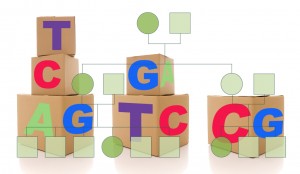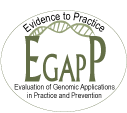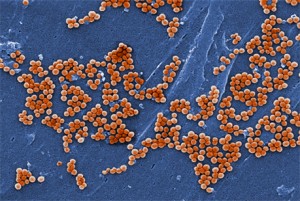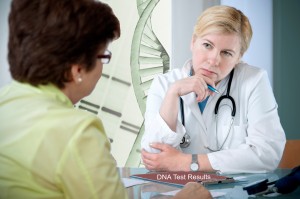Categories: evidence-based medicine, family history, genomics, public health
October 3rd, 2012 11:07 am ET -
Scott Bowen, Office of Public Health Genomics, Centers For Disease Control and Prevention
Karen Greendale, Office of Public Health Genomics, Centers For Disease Control and Prevention
A Working Meeting and an Action Plan
to Save Lives Now
Nearly 2 million Americans are affected by one of three genetic conditions with a strong risk of early morbidity and mortality: BRCA 1/2 with hereditary breast and ovarian cancer; Lynch syndrome and colorectal cancer; and familial hypercholesterolemia and early cardiovascular events. At present these conditions are poorly identified by the healthcare system but
evidence based recommendations are available to prevent disease and improve health.

Opening speaker, Dr. Ursula Bauer Director, NCCDPHP discusses a point later in the day with Dr. Khoury, OPHG Director
On September 7, 2012, eighty experts and stakeholders representing federal, state and local public health agencies, clinicians, key advocates and community leaders came together at CDC’s Roybal headquarters in Atlanta to develop a plan to use evidence based “Tier I” interventions) to reduce morbidity and mortality from these three conditions. The event was organized by the CDC Office of Public Health Genomics (OPHG) with help from the University of Michigan Center for Public Health and Community Genomics, Genetic Alliance, and a multi-disciplinary planning committee).
 Post a Comment -
Read more
Post a Comment -
Read more

Categories: evidence-based medicine, family history, genomics
September 27th, 2012 12:03 pm ET -
Katherine Kolor, Office of Public Health Genomics, Centers for Disease Control and Prevention
Muin J Khoury, Director, Office of Public Health Genomics, Centers for Disease Control and Prevention
 A new podcast from the CDC Expert Commentary Series on Medscape—Family Health History: Use It to Inform Preventive Services for Your Patients— describes how family health history can inform the delivery of preventive health services. The podcast presents three case studies based on recommendations of the US Preventive Services Task Force (USPSTF): screening for lipid disorders in adults, colorectal cancer screening, and BRCA genetic counseling and evaluation. Each case study demonstrates how family health history can be used to define a population subgroup whose increased risk could warrant more intensive preventive intervention. Family health history—which reflects the effects of genetic and environmental risk factors shared within families—has been called the “first genetic test.”
A new podcast from the CDC Expert Commentary Series on Medscape—Family Health History: Use It to Inform Preventive Services for Your Patients— describes how family health history can inform the delivery of preventive health services. The podcast presents three case studies based on recommendations of the US Preventive Services Task Force (USPSTF): screening for lipid disorders in adults, colorectal cancer screening, and BRCA genetic counseling and evaluation. Each case study demonstrates how family health history can be used to define a population subgroup whose increased risk could warrant more intensive preventive intervention. Family health history—which reflects the effects of genetic and environmental risk factors shared within families—has been called the “first genetic test.”
 Post a Comment -
Read more
Post a Comment -
Read more

Categories: evidence-based medicine, genomics
September 20th, 2012 1:12 pm ET -
W. David Dotson, Office of Public Health Genomics, Centers for Disease Control and Prevention
Michael P. Douglas, Office of Public Health Genomics, Centers for Disease Control and Prevention
 The independent EGAPP working group (EWG) held its 25th meeting on September 10-11, 2012 at the CDC campus in Atlanta. Highlights included:
The independent EGAPP working group (EWG) held its 25th meeting on September 10-11, 2012 at the CDC campus in Atlanta. Highlights included:
- Three EWG recommendation statements on the validity and utility of genetic tests are pending publication on:
- KRAS, BRAF and other markers involved in EGFR signaling, which are used to inform choice of therapies for metastatic colorectal cancer, recently submitted to Genetics in Medicine;
- Risk assessment for type 2 diabetes, in pre-submission peer-review; and
- SNP panels for prostate cancer risk assessment (based on a recently completed evidence review by investigators at the McMaster University AHRQ Evidence-based Practice Center), currently being finalized.
- The Knowledge Synthesis Center (KSC) will conduct systematic reviews on familial hypercholesterolemia and colorectal cancer screening – the latter topic is being done in conjunction with modeling by NCI/CISNET .
- The KSC is developing a manuscript for publication on methods and considerations for “binning findings from whole genome sequencing”.
 Post a Comment -
Read more
Post a Comment -
Read more

Categories: genomics
September 13th, 2012 3:00 pm ET -
Muin J Khoury, Director, Office of Public Health Genomics, Centers for Disease Control and Prevention
Katherine Kolor, Office of Public Health Genomics, Centers for Disease Control and Prevention
 Public health surveillance indicators, such as those developed for the Healthy People initiative are useful for monitoring the development of genomic medicine in the United States. For several decades, Healthy People has established health benchmarks that are considered important metrics for tracking progress in health and healthcare in the United States.
Public health surveillance indicators, such as those developed for the Healthy People initiative are useful for monitoring the development of genomic medicine in the United States. For several decades, Healthy People has established health benchmarks that are considered important metrics for tracking progress in health and healthcare in the United States.
 Post a Comment -
Read more
Post a Comment -
Read more

Categories: epidemiology, genomics, whole genome sequence
September 6th, 2012 1:00 pm ET -
Marta Gwinn, Consultant, McKing Consulting Corp, Office of Public Health Genomics, Centers for Disease Control and Prevention

Staphylococcus aureus bacteria
Late last year, Science magazine published a list of six Areas to Watch in 2012. Number 6 on the list, NASA’s Curiosity rover, recently touched down on Mars. The Higgs boson (#1) has been found, faster-than-light neutrinos (#2) have been debunked, and further developments on stem-cell metabolism (#3) and treatments for intellectual disability (#5) are in progress.
Now genomic epidemiology (#4) is approaching the public health launch pad. As Science’s editors predicted, pathogen genome sequences are being used to “determine quickly where newly emerging diseases come from, whether microbes are resistant to antibiotics, and how they are moving through a population.”
 Post a Comment -
Read more
Post a Comment -
Read more

Categories: evidence-based medicine, genomics
August 23rd, 2012 2:53 pm ET -
Michael P. Douglas, Office of Public Health Genomics, Centers for Disease Control and Prevention
W. David Dotson, Office of Public Health Genomics, Centers for Disease Control and Prevention
 In a previous blog, CDC’s Office of Public Health Genomics announced a list of health-related genomic tests and applications, stratified into three tiers according to the availability of scientific evidence and evidence-based recommendations as a result of systematic reviews. The list is intended to promote information exchange and dialogue among researchers, providers, policy makers, and the public. We have updated the list to include tests that have been discussed in a recent article by the National Comprehensive Cancer Network (NCCN). For these tests, we have considered NCCN recommendations and other evidence-based reviews, reports or assessments from Blue Cross Blue Shield Association Technical Evaluation Center (TEC) and guidelines from the National Institute for Health and Clinical Excellence in the placement of individual tests within the OPHG tier list.
In a previous blog, CDC’s Office of Public Health Genomics announced a list of health-related genomic tests and applications, stratified into three tiers according to the availability of scientific evidence and evidence-based recommendations as a result of systematic reviews. The list is intended to promote information exchange and dialogue among researchers, providers, policy makers, and the public. We have updated the list to include tests that have been discussed in a recent article by the National Comprehensive Cancer Network (NCCN). For these tests, we have considered NCCN recommendations and other evidence-based reviews, reports or assessments from Blue Cross Blue Shield Association Technical Evaluation Center (TEC) and guidelines from the National Institute for Health and Clinical Excellence in the placement of individual tests within the OPHG tier list.
 1 Comment -
Read more
1 Comment -
Read more

Categories: genomics, personal genomics
July 26th, 2012 2:35 pm ET -
Muin J Khoury, Director, Office of Public Health Genomics, Centers for Disease Control and Prevention
Katherine Kolor, Office of Public Health Genomics, Centers for Disease Control and Prevention
 Personal genomic tests are now widely available and sold directly to consumers, but population-based data are limited on awareness, use and impact of these tests. In collaboration with 4 state public health genomics programs, we have recently reported on consumer awareness and use of personal genomic tests using the 2009 Behavioral Risk Factor Surveillance System. Awareness of personal genomic tests ranged from 15.8% in Michigan to 29.1% in Oregon. Factors associated with increased awareness include higher education, higher income, and increasing age (up to age 75 years). Awareness is greater in this study compared with a similar survey conducted in 2006. Although less than 1% of respondents had used these tests, we estimated that between 200 thousand and over 1 million people have undertaken these tests in the US, with about one-half of them sharing the results with a health-care provider. These data indicate a potentially “teachable moment” for consumers and health care providers to engage in a dialogue on improving health and preventing disease using these tests as a starting point for discussion.
Personal genomic tests are now widely available and sold directly to consumers, but population-based data are limited on awareness, use and impact of these tests. In collaboration with 4 state public health genomics programs, we have recently reported on consumer awareness and use of personal genomic tests using the 2009 Behavioral Risk Factor Surveillance System. Awareness of personal genomic tests ranged from 15.8% in Michigan to 29.1% in Oregon. Factors associated with increased awareness include higher education, higher income, and increasing age (up to age 75 years). Awareness is greater in this study compared with a similar survey conducted in 2006. Although less than 1% of respondents had used these tests, we estimated that between 200 thousand and over 1 million people have undertaken these tests in the US, with about one-half of them sharing the results with a health-care provider. These data indicate a potentially “teachable moment” for consumers and health care providers to engage in a dialogue on improving health and preventing disease using these tests as a starting point for discussion.
 Post a Comment -
Read more
Post a Comment -
Read more

Categories: genomics
June 21st, 2012 11:41 am ET -
Muin J Khoury, Director, Office of Public Health Genomics, Centers for Disease Control and Prevention
 In spite of the promise of genomics and related technologies for a new era of precision healthcare and disease prevention, only a handful of genomic tests and applications have been recommended for use in clinical practice. Nevertheless, implementation of even the few recommended genomic tests is lagging. For example, implementing the 2005 USPSTF recommendation on genetic counseling of high risk women for BRCA testing is still not optimal, in spite of years of efforts by health care providers and genetic counselors. A recent study from a national sample of 14.4 million commercially insured patients shows underutilization of BRCA testing to guide breast cancer prevention among African-American and Hispanic women compared to whites. In addition a recent survey of primary care providers showed that only 19% consistently recognize the family history patterns identified by the USPSTF as appropriate indications for BRCA referral for evaluation. Likewise, implementing the 2009 EGAPP recommendation on testing all new cases of colorectal cancer for Lynch syndrome to reduce morbidity and mortality in relatives is just getting started. Substantial challenges in the healthcare system currently exist in the identification of Lynch syndrome in patients and their affected relatives. A Lynch Syndrome Screening Network was recently launched to accelerate research and implementation of Lynch Syndrome testing.
In spite of the promise of genomics and related technologies for a new era of precision healthcare and disease prevention, only a handful of genomic tests and applications have been recommended for use in clinical practice. Nevertheless, implementation of even the few recommended genomic tests is lagging. For example, implementing the 2005 USPSTF recommendation on genetic counseling of high risk women for BRCA testing is still not optimal, in spite of years of efforts by health care providers and genetic counselors. A recent study from a national sample of 14.4 million commercially insured patients shows underutilization of BRCA testing to guide breast cancer prevention among African-American and Hispanic women compared to whites. In addition a recent survey of primary care providers showed that only 19% consistently recognize the family history patterns identified by the USPSTF as appropriate indications for BRCA referral for evaluation. Likewise, implementing the 2009 EGAPP recommendation on testing all new cases of colorectal cancer for Lynch syndrome to reduce morbidity and mortality in relatives is just getting started. Substantial challenges in the healthcare system currently exist in the identification of Lynch syndrome in patients and their affected relatives. A Lynch Syndrome Screening Network was recently launched to accelerate research and implementation of Lynch Syndrome testing.
 Post a Comment -
Read more
Post a Comment -
Read more

Categories: evidence-based medicine, genomics
May 24th, 2012 11:57 am ET -
W. David Dotson, Office of Public Health Genomics, Centers for Disease Control and Prevention
Michael P. Douglas, Office of Public Health Genomics, Centers for Disease Control and Prevention
Synopsis of the 24th Meeting of the Evaluation of Genomic Applications in Practice and Prevention (EGAPP) Working Group

The EGAPP working group (EWG) has held 24 meetings in the 7 years since they were first convened; the latest EGAPP meeting was May 7-8, 2012 on the campus of CDC in Atlanta. Since it is often difficult for interested parties to attend EGAPP meetings, either due to travel or scheduling reasons, we have decided to institute a regular blog to follow each of these meetings which we hope will keep you up to date on what and how EGAPP is doing.
 Post a Comment -
Read more
Post a Comment -
Read more

Categories: genomics, obesity
May 17th, 2012 8:51 am ET -
Marta Gwinn, Consultant, McKing Consulting Corp, Office of Public Health Genomics, Centers for Disease Control and Prevention
 On May 7-9, the CDC Division of Nutrition, Physical Activity, and Obesity, hosted a conference on Weight of the Nation™ in Washington, D.C. The conference served to highlight progress in the prevention and control of obesity through policy and environmental strategies. The Weight of the Nation is also the title of an HBO Documentary Films and Institute of Medicine (IOM) film series that premieres May 14 and 15.
On May 7-9, the CDC Division of Nutrition, Physical Activity, and Obesity, hosted a conference on Weight of the Nation™ in Washington, D.C. The conference served to highlight progress in the prevention and control of obesity through policy and environmental strategies. The Weight of the Nation is also the title of an HBO Documentary Films and Institute of Medicine (IOM) film series that premieres May 14 and 15.
HBO’s The Weight of the Nation website explains that each of the four films in the series will feature “case studies, interviews with our nation’s leading experts, and individuals and their families struggling with obesity.” The first film examines the scope of the obesity epidemic and explores the serious health consequences of being overweight or obese. The second discusses what science has shown about how to lose weight, maintain weight loss and prevent weight gain; the third focuses on obesity in children. The fourth film, titled Challenges, offers a systems perspective on the combined effects of the major driving forces causing the obesity epidemic. These include complex social and environmental factors—such as agriculture, economics, and food marketing; cultural and behavioral factors—such as American food culture and physical inactivity; and evolutionary biology.
Any explanation of the obesity epidemic has to consider both ge
 1 Comment -
Read more
1 Comment -
Read more











